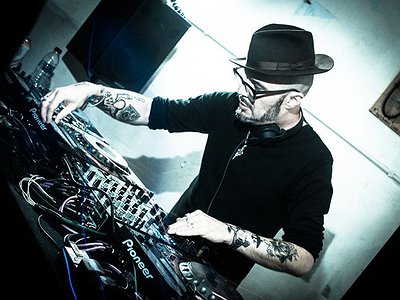It has today almost become customary to radically change pieces in the act of mixing and to increase the creative input of the DJ even to the level of the actual composition. What's your take on that and in how much do you make use of these possibilities yourself? Is there such a thing as 'disrespectful mixing'?
It's good if you can do it well, and I think in the hands of some, it’s fabulous, but DJing can run the risk of trying too hard to justify itself as an art form. At the end of the day, a good tune is a good tune, even if you’ve created it from bits of other tracks or if it's just one track played after another; both can be sublime, both can bore the pants off the crowd…
You don’t ‘have to’ do one or the other. Just do it with love and passion whatever you do. As for ‘disrespectful mixing’ I’m not sure what that is? Mixing is a means to create an atmosphere, it’s not an end in itself. I’m not too bothered about the process, just the result.
One of the most important aspects of a DJ set are the transitions from one track to the next. What makes a transition successful from your perspective? What are some of the considerations that go into deciding which track to play next - are these purely subjective to you or are there objective things that work or don't work?
A good flow in a set is very important, it doesn’t have to mean fancy trickery, or even perfect mixing, a bit of jeopardy can add flavour. These days most tracks come with at least 16 bars of drums! So if you are playing house and can count to four you should be fine.
Great mixing can add energy to a night, and it's great fun to do, but everyone makes mistakes, and that’s cool, it can be hilarious too. I guess you should avoid clashing vocals if you’re playing them, but I’ve never been bothered about mixing in key, sounds a bit like someone trying to be a virtuoso piano player rather than a club DJ. I’m not sure Larry Levan sat in the booth with a tuning fork, but I may be wrong.
Again, I think there is a danger of over-thinking the art of DJing. The first thing you need is fanatical passion, the second is a selection of killer numbers, thirdly the skill to stick it together without everyone falling over as you smash a 90 bpm trip hop number into 150 pm gabba. That’s about it I think. I suppose over a space of time you might develop a few ’signature tunes’, favourites you might always play? I like that. You might also have mixes you do that work well, and you might subconsciously repeat them for a while? I try to be aware of a tune over-staying its welcome in sets, but then I might welcome them back with open arms from time to time!
How do you see the balance between giving the crowd what they want and treating them to something new? What's your take on the idea of the DJ as an "educator" and is the relationship with the dancers a collaborative one or, as Derrick May once put it, a “battle”?
It’s not so much a battle as a form of Communion, sharing the vibe. Personally I like to be surprised, I like to hear new stuff, or old tunes I’ve never heard before, but I probably do enjoy dropping a few faves. To have a crowd go nuts to the odd classic can be fun. I like a bit of variety, but I have to keep adding new exciting music to the pot!
I could play the whole night with just the great tunes I got this week, so that’s a driving force for me: the enthusiasm to share new music. I do those revival nights now and then, but I try to keep them to special occasions, at those you can sometimes play lesser-known old numbers too. To me the key is progression, that’s why Acid House has sustained itself all these years, you have to keep representing the new exciting sounds… that’s what keeps me going as a DJ .
It is customary for many DJs to also produce tracks of their own, thereby lifting the former 'division of labor' between the two. How do you feel about this – and in which way can both sides benefit from this? How does your work as a DJ influence your studio productions and vice versa?
I’m not sure there has been a “division of labour” for a while now, DJs have made tracks or remixed tracks for the dancefloor for years, stretching back decades. It's that knowledge of what works on the floor that makes a DJ’s input and insight so important. They naturally feed off each other. I still get a buzz trying out new tracks in a club straight from the studio, so they seem quite connected. Having said that I do think a lot of DJs are pressurised into making music as a marketing tool these days, and that is never a pleasant thing. It must be a natural fit, coming from a place of passion and enthusiasm, not a management focus group.
With more and more musicians creating than ever and more and more of these creations being released, what does this mean for you as an artist in terms of originality? What are some of the areas where you currently see the greatest potential for originality and who are some of the artists and communities that you find inspiring in this regard?
There has never been a better time for electronic music in my opinion. Sure you have to do a lot more sifting to get to the gems, but what gems! The list is huge from the cream of house producers like Gerd Jansen, Matrixxman, Lauer, Jean Nipon, and Andreas Gehm, more alternative stuff like Red Axes, Vox Low, Perdido Key, Heretic, Mondowski, Optimo stuff, electronica vibes from Phantom Horse, Blair French, Jonas Munk,Listening Centre…. The list is endless but those are a few I like. That’s on top of the avalanche of undiscovered psych, afro beat and reggae numbers that keep getting reissued. What a time to be alive! Except in the financial sense.
Reaching audiences usually involves reaching out to the press and possibly working with a PR company. What's your perspective on the promo system? In which way do music journalism and PR companies change the way music is perceived by the public?
I’ve no real interest in the mechanics of the music industry to be honest. I’ve always worked with PR people who get what I do, and we just put an honest package of information and sounds out there. Let people make their minds up with minimal spin. I’m 47 not 19, so I can’t pretend to be a fresh-faced pop sensation, but I would like to reach as many people as I can because I think people will dig it.
It is remarkable, in a way, that DJing has remained relevant for such a long time. Do you nonetheless have a vision of DJing, an idea of what it could be beyond its current form?
Music speaks to the very primal, ancient part of our being, it makes people throw off reason and go wild….dancing is a basic part of us. So no, I don't have any grand visions, because at its heart, DJing is about entertainment and facilitating people getting together, sharing music and good vibes; that will never change.
Celebrity sync button scandals, pie-throwing or stadium pyrotechnics are all side-shows. The true believers will carry on long after the mainstream has lost its shit to some other vacuous fad. Technology may change how we do it, it may even change how we hear it. Who knows? Maybe we can plug directly into peoples’ minds? It doesn’t matter as long as people are getting together and sharing that sublime rush. DJing isn’t rocket science but it is magic.
Find out what Justin Robertson is up to online at www.justinrobertson.co.uk



